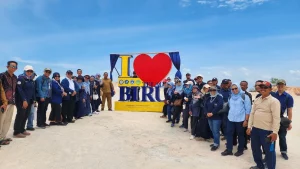Sea is critical for human society as a whole1 and important for states. Throughout history, the sea has had a variety of functions, including serving as a source of food, trade route, mean of conquest, battlefield, for fun or entertainment, body of water that divides or unifies nations, as well as for the exploitation of natural and mineral resources.2 The sea plays an important role in the economic and defensive sectors of coastal states. Utilization of marine resources can be an important source of economic growth for a coastal state. Abundant marine resources, both living and non-living, are also offset by increasing market demand.
HISTORY OF NATURAL RESOURCE MANAGEMENT IN EEZ REGULATIONS
The emergence of the international law of the sea cannot be separated from the history of the development of international law of the sea which recognizes two concepts, first, res communis, which states that the sea is the common property of mankind, and can not be appropriated or owned by a state. Second, res nullius, which states that since no one owns the sea, it can therefore be appropriated and owned by individual states. At sea, the “first come first serve” rule applies, i.e. those who come first have the right to control the area.14Two theories emerged, namely the Bartolus Theory and the Baldus Theory. Based on Bartolus theory, the sea is divided into two parts – the part under the sovereignty of coastal states and the part free from the power and sovereignty of any state. This theory is the basis for the division of the sea into territorial sea and the high seas. By contrast, the Baldus Theory distinguishes three concepts related to sea control, namely the ownership of the sea, marine use, and jurisdiction over the sea and the power to protect interests at sea.
THE PHILOSOPHICAL BASIS OF THE AUTHORITY OF COASTAL STATES TO MANAGE NATURAL RESOURCES IN THE EEZ
EEZ is one of the economically most important marine zones.26 An indication of the significance of this zone is that it includes more than 90% of the fishery resources, 87% of the discovered hydrocarbon resources and 10% of the manganese in the world. It is also noteworthy that almost all the important navigation routes worldwide are inside EEZs.27As explained in the previous sub-chapter, the marine zone which is currently known as the EEZ, was formerly considered high seas where no single state could exercise its sovereignty and sovereign rights. The waters with a maximum width of 200 nm from the baseline became an EEZ and came under the jurisdiction of coastal states. This area is governed by a sui generis legal regime that tries to keep the balance between the rights and duties of coastal and non-coastal states.28 In the EEZ coastal states have sovereign rights to explore and exploit, conserve, and manage natural resources, both living and non-living in waters superjacent to the seabed and of the seabed and in its subsoil. Sovereign rights also include activities needed to support exploration and exploitation of the zone. The jurisdiction of coastal states over the EEZ is related to the creation and use of artificial islands, installations and structures, scientific research, as well as the protection and sustainability of the sea.Article 61 of UNCLOS 1982 requires coastal states to determine Total Allowable Catches (TACs) to ensure resource sustainability. The EEZ has major implications for the efficient utilization of fish resources through its limitation of free access.29A coastal state that does not have the ability to utilize its entire TACs, can allow another state to use the remaining TACs. The above provisions are only an option, not an obligation, so whether a coastal state will grant another state permission to explore and exploit its EEZ is entirely up to the coastal state. The decision must take into account all factors, including the importance of these fishery resources for the economy of the coastal state, as well as the needs of the state that will explore and exploit the surplus of these fishery resources.
CONCLUSION
The conclusion drawn from the discussion on the formulation of the problem is that the philosophical basis of the authority of coastal states to manage natural resources in the EEZ is based on sovereign rights exercised for peaceful purposes, to protect the environment and ensure the sustainability of fishery resources, paying attention to the rights of developing coastal, landlocked or geographically disadvantaged states.In other words, sovereign rights include not only rights, but obligations as well. In fact, sovereign rights are privileges in the form of rights granted to coastal states accompanied by great obligations and responsibilities. Coastal states should manage their waters either by exploring or exploiting natural resources for peaceful purposes, taking into account their sustainability, and justice in the use and utilization of the sea.
Penulis : Enny Narwati
Kumala, M. T., Sunyowati, D., Narwati, E. and Vinata, R. T. (2023) “The Philosophical Basis of the Authority of Coastal States to Manage Natural Resources in Their Exclusive Economic Zone (EEZ)”, Transactions on Maritime Science. Split, Croatia, 12(1). doi: 10.7225/toms.v12.n01.w05.









